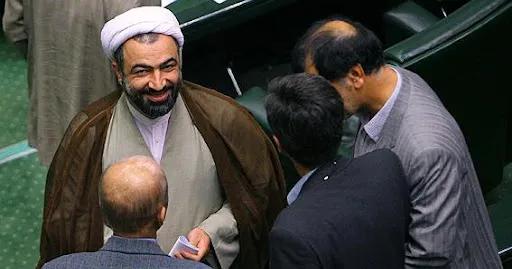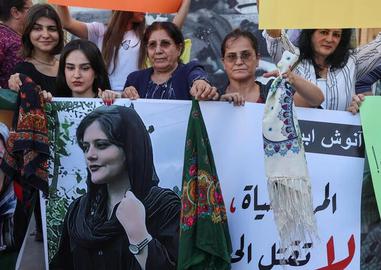Blaming Western countries and opposition groups for protests in Iran is standard practice for the Islamic Republic. But supporters of the regime now also venture into psychology to cast blame for social unrest in the country on “sexual agitation,” “computer games” and “remote learning because of the pandemic”. The loudest voice among these gaslighters has been Ali Akbar Raefipour, a public speaker and the head of a think tank in Iran, who is fond of conspiracy theories and is keen to talk about Satanism, Freemasonry and Zionism.
“During two years of covid, teenagers sat at home and couldn’t go anywhere. Then they were sexually aroused by the internet. Now what is happening in the streets? It is the discharging of sexual urges on to the issue of women. What is happening is that these two factors have met,” said Raefipour in a TV interview on October 9.
“The generation of the war [between Iran and Iraq in the 1980s] fired RPGs to discharge these urges. Now where can our young people discharge them? That is why we have these strange fire-jumping festivals,” he said, referring to a traditional celebration when Iranians jump over bonfires on the last Wednesday of the Iranian calendar year.
Raefipour also blamed capitalism and its influence on young people: “When the country’s economy and everything else is Western, why not also the way that people dress?”
Raefipour was not alone in voicing such sentiments. “In this recent sedition, enemies are after a sexual revolution,” said Ruhollah Harizavi, vice-president of the Islamic Proselytizing Organization, on October 4, and claimed that “Woman, life, freedom,” chanted by protesters, are actually the “three main slogans of Islam.”
“They say that headscarves must be optional, but they would not stop at removing headscarves. Today they are putting headscarves on sticks instead of their heads, but tomorrow they will strip off their shorts and hold them up high,” said Vahid Yaminpour, Secretary of the Supreme Council of Youth Affairs, in July, before the recent protests had started.
“Lack of identity and values”
Some other hardline figures in Iran blamed a “lack of identity and values” as the mean reasons why young Iranians were protesting, including Mohammad Sadegh Kushaki, a professor at Imam Sadigh University and a loyal supporter of Supreme Leader Ayatollah Ali Khamenei.
“Some of these young people and teenagers, who are seriously harmed by a lack of identity and values, were at the core of recent unrest. That is why their slogans do not match the demands of the people and are limited to going to swimming pools, mixed-gender parties and removing the hijab,” Kushaki said on October 6.
Protests as “sewage overflow”
Blaming the internet and other scapegoats is common among Iran’s hardliner establishment figures. “These protests live on the internet” and are like a “sewage that has overflowed”, said Hamid Rasaee, a former member of the parliament.
Javan, a newspaper published by the Revolutionary Guards, cited remote learning during the pandemic as one of the factors behind the protests. “During this time, a number of high school and university students entered into business on social media. Because their pages became well-known, they were able to put a lot of ads on their pages and achieved financial independence. They were able to solve their families’ financial problems as well and were able to have more authority in making personal decisions and became more and more independent,” wrote the newspaper.
“You must block the internet in a way that it cannot be opened even with filter-breakers,” said Mohsen Mehdian, CEO of Hamshahri newspaper, published by Tehran municipality, who was suggesting ways to suppress nationwide protests more effectively.
“Teenage urges” and “gamers”
Many hardline public figures have also said that young people who played video took to the streets to protest because of their hobby. Several online games were meanwhile blocked in Iran.
Some government-aligned websites called the protests an “unrest by TikTokers and gamers”. Earlier, in a cartoon, Tasnim News Agency, affiliated with the Revolutionary Guards, depicted gamers as parasites, lazy creatures that do nothing but worry about whether they can access their games.
“Some of the most exciting computer games were originally designed to bring teenagers to the streets,” said Abolfazl Ahmadi, secretary of Headquarters for Promoting Virtue and Prohibiting Vice in the province of Chaharmahal and Bakhtiari.
Calling protesters “whores”
Besides claiming that “sexual urges” contributed to protests, government media outlets have also called women protesters “prostitutes,” including the official newspaper Iran that compared female protesters to “Tall Pari”, a “famous sex worker” who played a role in the 1953 coup d’état against the nationalist Prime Minister Mohammad Mossadegh. Tall Pari, the newspaper wrote, showed the “link between prostitutes and thugs who wanted to topple a government of the people. Today again some of them scream their heads off. The infidels have mobilized the full power of their media but the end result of all their efforts has been a few small fireworks that will not break the will of the great nation of Iran in … following the path that it has chosen.”
And Colonel Nozar Nozari, commander of Riot Police in Kerman, said: “The suppression of the agents of prostitution and promiscuity, in recent days, was a clear example of standing up to cultural invasion.”
Good cop, bad cop
Raefipour’s statements created so much controversy that even the website Noor News, affiliated with Supreme National Security Council, objected. It criticized state TV for airing the “uninformed” opinions of an individual who often showed contempt for the intelligence of the audience.
Following a tweet by Hassan Abbasi, a conspiracy theorist and the head of the Revolutionary Guards think tank Center for Borderless Security and Doctrinal Analysis, Mehdi Fazaeli, who is also part of an office that disseminates the writings of the Supreme Leader, called Raefipour’s statements “immoral” and “harmful” and claimed that Khamenei had “rejected such views.”
But Abbasi had previously tweeted that “women celebrities try to start a revolution of the prostitutes by rising against the Islamic Revolution, which was a revolution of modesty and chastity.” Earlier, Abbasi had also said: “The basic meaning of ‘celebrity’ is fame and luxury. As such, there are no good celebrities.”
But few take these expressions of sympathy for protesters seriously – and most observers believe that Noor News and Fazaeli are merely playing the role of “good cops” alongside the “bad cops” who are busy suppressing the protesters.
visit the accountability section
In this section of Iran Wire, you can contact the officials and launch your campaign for various problems
































comments